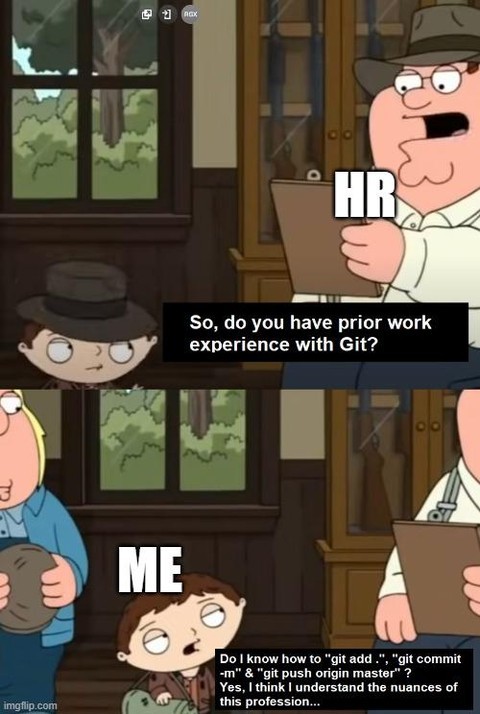this post was submitted on 03 Mar 2024
1097 points (97.7% liked)
Programmer Humor
19501 readers
1055 users here now
Welcome to Programmer Humor!
This is a place where you can post jokes, memes, humor, etc. related to programming!
For sharing awful code theres also Programming Horror.
Rules
- Keep content in english
- No advertisements
- Posts must be related to programming or programmer topics
founded 1 year ago
MODERATORS
you are viewing a single comment's thread
view the rest of the comments
view the rest of the comments

The thing is that for a majority of cases, this is all one needs to know about git for their job. Knowing git add, git -m commit "Change text", git push, git branch, git checkout , is most of what a lone programmer does on their code.
Where it gets complicated real fast is collaboration on the same branch. Merge conflicts, outdated pulls, "clever shortcuts," hacks done by programmers who "kindof" know git at an advanced level, those who don't understand "least surprise," and those who cut and paste fixes from Stackexchange or ChatGPT. Plus who has admin access to "undo your changes" so all that work you did and pushed is erased and there's no record of it anymore. And egos of programmers who refuse any changes you make for weird esoteric reasons. I had a programmer lead who rejected any and all code with comments "because I like clean code. If it's not in the git log, it's not a comment." And his git comments were frustratingly vague and brief. "Fixed issue with ssl python libs," or "Minor bugfixes."
Pretty sure I would quit on the spot. Clearly doesn't understand "clean" code, nor how people are going to interface with code, or git for that matter. Even if you write a book for each commit, that would be so hard to track down relevant info.
Yeah, I think that guy only got a superficial understanding of what Uncle Bob was saying.
My policy as a tech lead is this: In an ideal world, you don't need the comment because the names and the flow are good. But when you do need the comments, you usually really need those comments. Anything that's surprising, unusual, or possibly difficult to understand gets comments. Because sometimes the world is not ideal, and we don't have the time or energy to fully express our ideas clearly in code.
My policy on SCM logs is that they should be geared more towards why this commit is going in, not what is being done. And what other tickets, stories, bugs it relates to.
Lead of a small team of scripters here. The "Why. Not What" is defo a good way of encouraging cleaner code.
Had to request changes recently on a PR like this, big function with comments telling me what it was doing. When they resubmitted for review they had broken it down into smaller functions with good variable/function naming. following what was going on was much easier
Same strategy here, but recently found myself commenting on the “what”. There was a perfect built-in, but not really readable and I couldn’t figure out how to make it readable, so fine